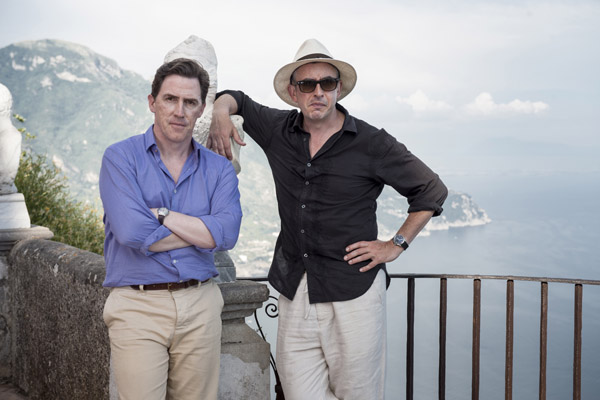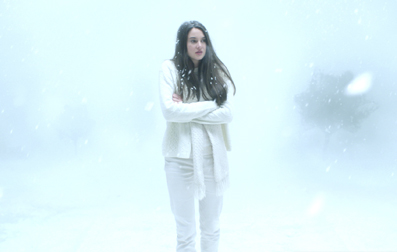Sundance 2014, for me, was about the levels of experience of its many directors. For a festival that showcases the work of emerging filmmakers, there were notably a remarkable number of films by well-established filmmakers. And the quality showed. Watching an Ira Sachs film or a Zellner Brothers film (this year being their eighth trip to the festival) reminds one of the depth of knowledge a filmmaker picks up over many years. Not that the first-timers display any lack of talent, but you know what I mean.
Locke
Tom Hardy is the only actor who appears on screen in this near-real-time drama about a man, Ivan Locke, at a pivotal moment in his life. Abandoning his job at the worst possible moment—he’s a contractor and his company is about to lay the foundation for one of the biggest construction projects in England—Locke chooses instead to drive several hours outside of London to support a woman with whom he’d had a one-time extramarital affair. She’s pregnant, and has sprung the news on him. The story unfolds entirely through Locke’s conversations on his speakerphone. It’s an interesting formal conceit, and at a relatively short 85-minute running time, it’s ably sustained throughout by longtime screenwriter/sophomore director Steven Knight. Only here and there does the occasional plot twist feel too deliberate. Listen for several talented voices on the other end of the phone and prepare yourself to see every possible angle of a man sitting in the driver’s seat of a car.
Overnighters
Here’s a little documentary gem about a small town in North Dakota and the influx of workers during the current oil boom in the state. Times are tough all over the country, and the offer of jobs created by the rush has brought in transplants from just about every state. Director Jesse Moss offers an insightful story about one local pastor, Jay Reinke, who risks animosity from his neighbors by allowing his church to provide housing to hundreds of men as they arrive empty-handed. Things become complicated when it’s discovered that one of Jay’s tenants is a former sex offender. Things get more complicated when Jay’s personal convictions (and personal life) become further mixed up in the story. Moss has incredible access to this fascinating man, and illuminates a much larger notion about the grey area between right and wrong that inevitably comes up during moments of drastic change within a community. Whatever your take, it’s hard to not to be impressed by this insightful and beautifully presented portrait of a slice of small-town USA.
Obvious Child
Jenny Slate basically stars as herself, an approaching-30 comedienne living in New York City making her way through a complicated love life. Between sets at a local stand-up bar, her character, Donna, is dumped by her current boyfriend. Eventually a one-night stand leads to an unexpected pregnancy, and hilarity ensues. Well not exactly in that order, but Gillian Robespierre’s debut (based on her short film of the same name) hilariously tackles sensitive subjects with the same ease Slate herself uses throughout her iconic act. No topic is taboo, from bodily functions to Jewish stereotypes. Robespierre’s film, fortunately, is a level above mere comedy, showing us a candid Donna in life moments most of us can empathize with. Slate is excellent, proving she has talent far beyond her stand-up act. This one is worth a watch.
Love Is Strange
The dearest scene I saw at Sundance occurs when Alfred Molina’s George returns to greet his longtime companion and recent husband (thanks New York State!), Ben, played by John Lithgow, after weeks of living apart. Wordlessly, the two embrace as he walks in the door, agonized and ecstatic in the same moment. George has been fired from his job of many years as a music instructor in a Catholic school. The church still refuses to tolerate homosexuality, and now that the two men have married, the diocese has taken action. They are forced to sell their apartment and crash on relatives’ couches until they can find an affordable place. Ira Sachs directs a good cast in this modest and delicate story about what it’s like to get older and hold on to a loving family. I only wonder about the title—the love in the film is the only thing that’s really never in question.
Kumiko the Treasure Hunter
My oh my, the directing chops on display here are tremendous. This is one of those exhaustive, measured, and excellent pieces of filmmaking that come along very seldom. And to boot, it’s an homage to another of those magical achievements of directing—Fargo. Yet, whereas Fargo was nearly a perfect film, I can’t say the same about Kumiko, despite all its excellent craft. It has all the indications of a great film: the scenes start and end just at the right time, the camera is always in a unique and interesting place, every frame could be a portrait, the soundtrack blends perfectly with the sound design and the picture. And although Rinko Kikuchi plays the main character Kumiko well, it’s hard to get past her as a character. Kumiko self-sabotages, doesn’t fit into society in any constructive way, and just can’t get a grip on interpersonal relationships. The story follows her on a vain quest from Tokyo all the way to the snows of North Dakota in an attempt to find the buried cash from the “true story” upon which Fargo is based. It’s an impossible pipe dream, yet she attempts it anyway. The Zellner Brothers, however well they tell this story, seem to have drunk the Kool-Aid themselves, and allow Kumiko to plod ahead with little regard to any realistic version of how this story would actually play out for her. It’s a remarkably realistic and well-made, complete fantasy.
Ping Pong Summer
If you saw 2011’s Septien, you’ll understand why this isn’t just another ’80s teen comedy. Director Michael Tully’s second feature utilizes the same brilliantly weird comedy that made his first film so memorable. Rad Miracle (newcomer Marcello Conte) is a shy suburban kid who encounters a host of zany characters while on a family vacation in Ocean City, Maryland. Rad forms a rivalry with the local bullyish ping-pong extraordinaire, Lyle Ace (Joseph McCaughtry), and goes on a Karate Kid-style hero’s journey on his way to a final showdown at the town arcade. Susan Sarandon, Amy Sedaris, Judah Friedlander, and Robert Longstreet all put in great work as funky locals. Stay attuned for the retro-ultra-hip soundtrack and fashion stylez throughout. This is the funky freshest indie of the year.
The Trip to Italy
Rob Brydon and Steve Coogan star in what is essentially the same film as 2010’s The Trip. Not that I’m complaining. I quite liked both. These two are complete cutups in their dry, understated way. Brits might call them “outrageous,” I’m sure, though on this side of the pond it takes a little more to get us going. Brydon is again asked to document a food tour, this time in southern Italy. He takes along best friend Steve, and the two go on an extended week-long banter act that’s admittedly not all that different from their established personalities. Director Michael Winterbottom is about as eclectic as they come, and here he does a fine job keeping these two knuckleheads from completely wallowing to death in their own in-jokes, overdone celebrity impressions, and catch phrases. Bravo to everyone involved in this film, it’s exactly what it’s supposed to be.
Hellion
Hellion is really well done, but it doesn’t give you too much more than you’re expecting: blue-collar family in a rural town, father can’t get over his wife’s death and drinks too much. Older son has behavior problems, younger son’s innocence is compromised due to it. Writer/director Kat Candler, who based this on her short film of the same name, pulls an exceptional performance out of Josh Wiggins, who plays Jacob, the older son. Likewise, Aaron Paul and Juliette Lewis are memorable as Jacob’s father and aunt. Emotionally charged, boldly-written with finely honed performances, it’s a powerful film, and full of well-rendered details about life in a small town and the human trials found within, yet I walked away with a familiar sense. If Sundance has any discernible brand, Hellion definitely fits it.
Hits
David Cross doesn’t exactly break the mold in his directorial debut, but at least he turns out a unique story about a local codger in a small upstate town whose weekly rants against the town assembly, publicized on YouTube, are noticed by a host of urban do-gooders who descend upon the town to come to his aid. Meanwhile, his ambitious daughter dreams of singing on a national talent show. It becomes her single focus, and eventually the stories meld together in an epic showdown, all conspicuously captured and shared via social media. Cross’s characteristic cynicism shines through, but the film is a bit too cartoonish to really take seriously. Cross, unfortunately, does not appear in the film, but luckily a good cast of funny people do. Watch for James Adomian, Wyatt Cenac, and Derek Waters playing a slapstick trio of Brooklyn activists.
The Signal
What starts as a spooky and mysterious Blair Witch homage becomes a droll and unremarkable sci-fi snoozer. Three IT students become obsessed with an unknown hacker, and, going out of their way to track him down, find themselves far deeper than they ever could have imagined. The hero, played by Brenton Thwaites, wakes in a hospital room and undergoes a series of interviews with an ominous official in a hazmat suit. The three struggle to bust out of the confines of the facility in which they are held against their will. The unfolding events are only mildly exciting, and the excellent setup unfortunately doesn’t follow through.
White Bird in a Blizzard
In the faux-storybook style of Mysterious Skin, Gregg Araki tells another tender story about sexuality in the suburbs. Shailene Woodley is Katherine, a high schooler boldly making choices about her virginity. At the same time, she and her father (an excellent Christopher Meloni) deal with the sudden disappearance of the mother (Eva Green). Araki is a distinctive director who has never shied away from risky content in his films. In fact, he embraces it. In White Bird in a Blizzard, he never allows the difficult subject matter to be a distraction. To the contrary, he embraces it. Araki’s world, especially here, is just a little more stylized in its look, feel, color, and level of dramatic content. It’s more dire, more close to the bone than the real world, but that’s the way these young people feel it. Audiences will feel it just the same.
Little Accidents
A mining accident in a small West Virginia town divides the community in Sarah Colangelo’s directorial debut, based on a short film of the same name (sound familiar?), starring Elizabeth Banks, Boyd Holbrook, and Josh Lucas. Beautifully shot on 35mm film, we follow the story through the eyes of a young boy mixed up in another little accident of his own. Colangelo, along with her cast, carves a really vivid portrait here, and audiences will walk away with a genuine sense of what life is like in this quiet burg. As events become more complicated and intertwined, spanning business and pleasure, the finale is inextricably complex, and leaves us with more questions than we had at the start of the film. In this case, though, I’m not sure if it’s a good sign. I’m left really wondering how the story continues after the credits roll. Ripe for a sequel?



















Leave A Comment